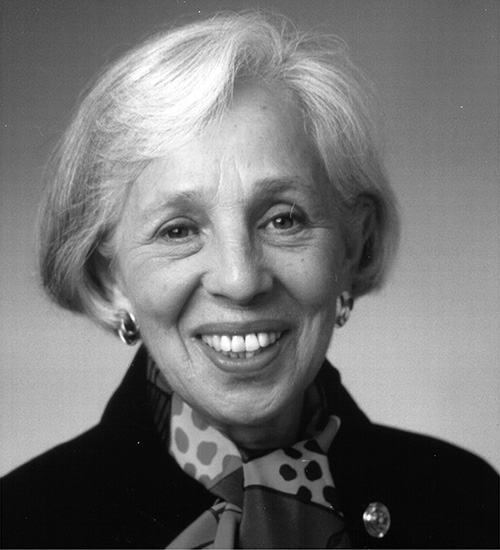In memoriam: Maxine Singer
Maxine Singer, a revolutionary molecular biologist, National Medal of science recipient, federal health official and inclusion advocate, died July 9, 2024, in Washington, D.C., of chronic obstructive pulmonary disease and emphysema. She was 93 and had been a member of the American Society for Biochemistry and Molecular Biology for over 60 years.

Singer was born Feb. 15, 1931, in New York City to a lawyer and homemaker. According to a Carnegie Science obituary, she developed an early interest in science as a public school student in Brooklyn, New York, which led her to Swarthmore College in Pennsylvania. She was one of the few women who graduated with a degree in chemistry.
Supported by a National Science Foundation fellowship, Singer earned a Ph.D. in biochemistry from Yale University in 1957. She then began her career as a postdoctoral fellow at the National Institutes of Health and focused her research on the emerging field of nucleic acids.
Singer’s scientific work was pivotal in the early days of molecular biology. She found that specific amino acids correspond to coding regions in RNA. Her discovery was foundational to deciphering the genetic code and laid the groundwork for future discoveries in genetic engineering. Much of her early work was published in the Journal of Biological Chemistry.
In the 1960s and 1970s, scientists began experimenting with DNA splicing. Singer understood the potential ethical complications of these experiments. According to a JBC Classics article, she worked with other scientists and was one of five signers in 1975 on the first set of universal guidelines for genetic experimentation that balanced scientific innovation and public safety concerns. The NIH adopted these guidelines one year later.
Singer was promoted to chief of nucleic acid research at the National Cancer Institute in 1980. There, she discovered that DNA sequences can relocate within a chromosome and cause mutations and, potentially, disease.
After working at the NIH for many years, Singer became the eight president of Carnegie Science in 1988. At Carnegie, she created national science education and outreach programs and was a strong advocate for women and historically underrepresented groups in science. According to an obituary in The Washington Post, some male researchers refused to work in her laboratory.
“I’ve given talks where it was really important for me to say, ‘Yes, I’m a nerd and I’m proud of it,’” she said in a 2002 interview with The New York Times. “It’s important for people to see this small, gray-haired Jewish grandma, that I’m one of them. I’m not some crazy person, and few of my colleagues are.”
Her contributions to science and society were widely recognized. President George H.W. Bush awarded Singer the National Medal of Science in 1992 for “her outstanding scientific accomplishments and her deep concern for the societal responsibility of the scientist.”
Singer served on the ASBMB Council from 1978 to 1982, was elected to the National Academy of Sciences in 1979 and received numerous awards, including the Association for the Advancement of Science’s William D. Carey Lectureship Award for Leadership in Science Policy, the National Science Board’s Vannevar Bush Award and the National Academies of Science, Engineering and Medicine’s Public Welfare Medal.
In 2007, her work on the polynucleotide phosphorylase polymerization reaction, polyribonucleotide chain degradation and nucleotide variants of simian virus 40 was honored in a JBC Classics article. She shared the ASBMB’s Howard K. Schachman Public Service Award with Bruce Alberts in 2013 “for their extensive work as champions for young scientists and their efforts to improve science education.”
She is survived by her husband, Daniel; four children and four grandchildren.
Enjoy reading ASBMB Today?
Become a member to receive the print edition four times a year and the digital edition monthly.
Learn moreGet the latest from ASBMB Today
Enter your email address, and we’ll send you a weekly email with recent articles, interviews and more.
Latest in People
People highlights or most popular articles

Building a career in nutrition across continents
Driven by past women in science, Kazi Sarjana Safain left Bangladesh and pursued a scientific career in the U.S.

Kiessling wins glycobiology award
She was honored by the Society for Glycobiology for her work on protein–glycan interactions.

2026 ASBMB election results
Meet the new Council members and Nominating Committee member.

Simcox wins SACNAS mentorship award
She was recognized for her sustained excellence in mentorship and was honored at SACNAS’ 2025 National Conference.

From humble beginnings to unlocking lysosomal secrets
Monther Abu–Remaileh will receive the ASBMB’s 2026 Walter A. Shaw Young Investigator Award in Lipid Research at the ASBMB Annual Meeting, March 7-10 in Washington, D.C.

Chemistry meets biology to thwart parasites
Margaret Phillips will receive the Alice and C. C. Wang Award in Molecular Parasitology at the ASBMB Annual Meeting, March 7-10 in Washington, D.C.

